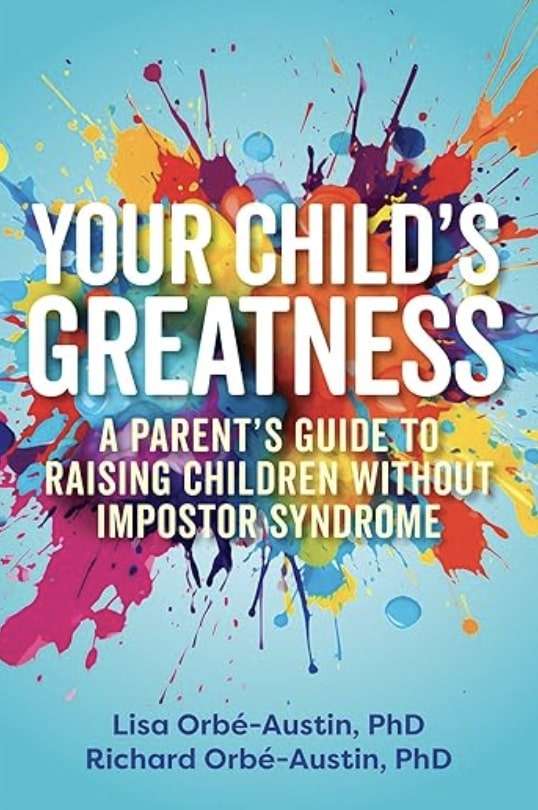“Am I really good enough, or did I just get lucky?” It’s a question many children, teens, and young adults may wrestle with—sometimes for years.
This internal doubt is more commonly known referred to imposter syndrome. And according to research, nearly 70% of people will experience it at some point in their lives.
“Imposter syndrome is first and foremost not a mental health disorder,” Dr. Richard Orbe-Austin, licensed psychologist told Lianne Castelino during an interview for Where Parents Talk. “It’s a phenomenon where someone believes they are a fraud. They attribute their success to luck or relationships, underestimate their own abilities, and constantly live in fear of being exposed as not good enough,” he says.
An executive coach, author, and father of two, Dr. Orbé-Austin, has made it his life’s work to help families understand and overcome the effects of imposter syndrome.
Unlike low self-esteem, which tends to be domain-specific (“I’m not good at math”), imposter syndrome is global. “If you ask someone with imposter syndrome what their strengths are,” he explains “they may say, ‘I don’t have any. I’ve just been lucky.’”
How Early Does It Begin?
“It can start as early as six or seven,” says Orbé-Austin. “It happens when children are given roles in the family—‘you’re the smart one,’ ‘you’re the hardworking one,’ or ‘you’re the survivor.’”
Those roles shape a child’s self-narrative. If the “smart one” struggles later in high school, self-doubt creeps in: Maybe I was never smart at all. For the “hardworking one,” the pressure becomes endless overwork to prove worth. Survivors, meanwhile, often feel invisible and disconnected from their own talents.
The Silent Struggle: Why Kids Don’t Talk About It
Imposter syndrome is more common than many realize. “About 70% of people will experience imposter feelings at one point,” Orbé-Austin notes. “But many feel ashamed, so they don’t talk about it. They think they’re the only ones.”
That silence can be damaging, particularly for young people. Without words to describe their feelings, kids can internalize the belief that they don’t measure up—even when the evidence proves otherwise.
What Fuels Imposter Syndrome in Kids Today?
While family dynamics play an early role, Orbé-Austin points to broader cultural forces that make things worse.
“We live in a hyper-competitive environment where parents feel like as soon as the child is out of the womb, we need to get going to make sure they achieve,” he says. “The message being sent is that love is linked to achievement.”
He warns that this mindset, often tied to helicopter or “snowplow” parenting and toxic achievement culture, sends a dangerous signal: If I don’t achieve, I’m not lovable.
What Sustains It?
Even once kids leave home, imposter feelings often persist. Orbé-Austin explains, “Imposter syndrome is sustained by toxic factors. In school, in teams, or later in workplaces, young people feel like they have to be superstars every day—or risk being scapegoats.”
Burnout also plays a role. Many teens and young adults overload themselves with academics, extracurriculars, and social expectations, believing their worth depends on constant performance. “A lack of self-care fuels the cycle,” he adds.

Why Parents Need to Pay Attention
Some parents assume imposter syndrome is harmless or even motivating. Orbé-Austin cautions against this.
“Imposter syndrome has been linked to burnout, to mental health concerns, and to people turning down opportunities because they feel they’re not good enough,” he says. “We want parents to feel like they have the tools to intervene early—so kids don’t have to suffer with it into adulthood.”
Warning Signs Parents Should Watch For
So what does imposter syndrome look like in real life? Orbé-Austin offers two examples:
-
High schoolers might downplay their success and avoid applying to a dream school:
“I only got good grades because my teachers liked me. I’ll never survive college.” -
Young adults may overwork in their first job while avoiding promotions:
“I’m lucky to even be here. If I try to move up, I’ll be exposed as a fraud.”
Other red flags include constant negative self-talk, refusal to acknowledge strengths, and reluctance to celebrate achievements.
Parenting Styles That Make a Difference
Not all parenting styles affect kids equally. In his book Your Child’s Greatness, Orbé-Austin and his co-author (and wife) Dr. Lisa Orbé-Austin outline the risks:
-
Permissive parenting (few boundaries, little guidance) often leads to neglect and feelings of invisibility.
-
Authoritarian parenting (strict rules, harsh feedback) fosters people-pleasing and dependence on external validation.
-
Authoritative parenting, the healthiest balance, provides clear boundaries and warmth, empathy, and care.
“Authoritative parenting helps kids feel safe while also teaching them confidence,” he explains.
Building Confidence Without Pressure
Parents often wonder how to boost confidence without fuelling perfectionism. Orbé-Austin’s advice: start with yourself.
“Parents underestimate their impact in modelling confidence,” he says. “If you beat yourself up—‘How could I be so stupid?’—kids pick up on that. Be mindful of what you’re communicating.”
He also urges parents to measure progress against the child’s own growth, not against classmates or siblings. “Celebrate the effort and growth they’ve made, even if it doesn’t match someone else’s timeline.”
Helping a Child Already Struggling
If a child is already showing signs of imposter syndrome, Orbé-Austin recommends two first steps:
Bolster their narrative. “Kids with imposter syndrome have thin stories about themselves: I was just lucky. Help them articulate their actual skills—communication, leadership, persistence—that explain their success.”
Address automatic negative thoughts (“ANTs”). These include:
Mind reading: “Everyone thinks I don’t belong here.”
Fortune telling: “If I try, I’ll fail.”
Parents can help by gently challenging these thoughts and encouraging more balanced perspectives.
Redefining Greatness for Kids
At the heart of this conversation for parents in particular, Orbé-Austin’s says, is a need to redefine success.
“Striving for perfection is impossible. Striving for greatness means appreciating your strengths while always seeking to grow,” he says. “Every child has unique talents, even if they don’t align with what parents envision.”
He cautions against sibling comparisons: “Each child’s journey is unique. The best thing you can do is support that path—whether it’s in music, sports, theatre, or something entirely different.”
path—whether it’s in music, sports, theatre, or something entirely different.”
The Role of Parents
For parents who feel overwhelmed, Orbé-Austin’s offers this perspective: “You are one of the primary influences on your child’s development—never underestimate that.
Even when teachers, coaches, or peers gain influence, your support, empathy, and guidance can shape whether imposter syndrome takes root or gets defeated.”
He adds, “You have the power to prevent it, or if it’s already there, to help your child rewrite their story.”
Related links
